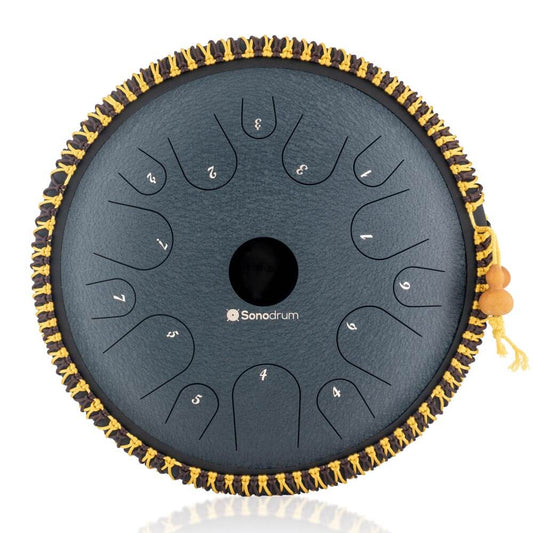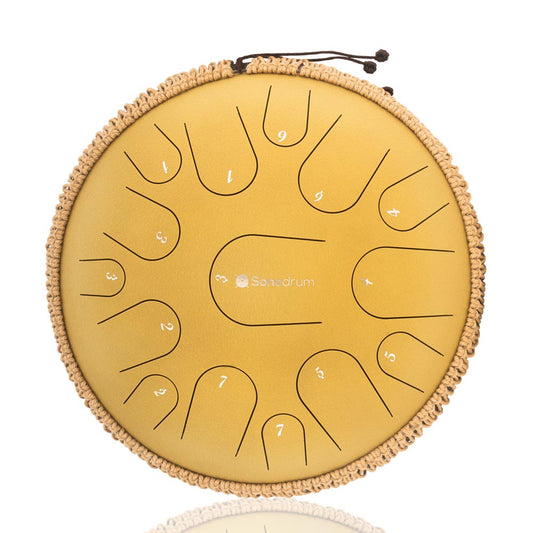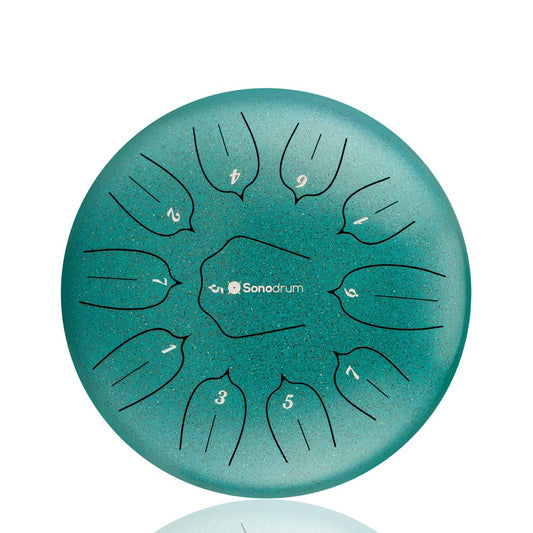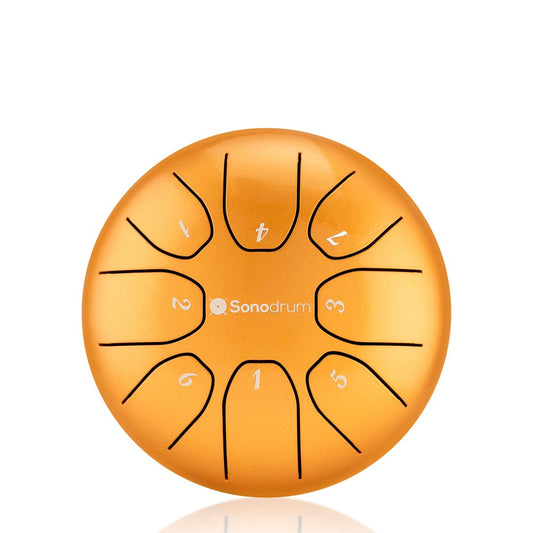The Steel Tongue Drum is incredible because you can play it intuitively and create beautiful music without needing experience or training. Since each drum is tuned to perfectly harmonize with itself, you can hit any note and create magic, no matter which tongue drum scale you prefer. This means you spend less time thinking and can simply lose yourself in the flow of making music and sounds.
The steel tongue drum has a peaceful and calming effect that you'll feel when playing it. It's perfect for unwinding at the end of the day or jamming with friends.
We've personally witnessed the calming effect of the Sonodrum on restless babies and unruly children. However, not every tongue drum scale is suitable for every situation.
Creative play can be practiced in any number of daily activities. Playing the tongue drum every day is great. There are scales that can make you feel melancholic and others that can bring joy all day long. So how do you choose the tongue drum scale that you like best? Which scale is especially good for beginners, and are there tongue drums that include different scales?
Questions upon questions that we will answer today. So stay tuned and learn all about different tongue drum scales and the aspects to consider when selecting your specific scale.
Choosing the right scale for your tongue drum
Clarity and depth of tone are paramount at Sonodrum. We've selected the steel and developed a larger acoustic chamber for a full, warm, and rich tone. But why do we offer only two tongue drum scales? Find out the reasons here...
Choosing a tongue drum scale, what does it depend on? You've just encountered a musician playing a magical instrument on a street corner. It was as if his hands were dancing on the instrument! It's a handpan or tongue drum! You're thrilled, captivated, and have decided that you must own one!
You head home, your mind still filled with beautiful melodies and captivating sounds. Let's go! You embark on the quest for this unique instrument that finally seems to "fit" you and meet your need to make music. You have little or no musical experience and discover online that the tongue drum is not a chromatic instrument (like a piano, where each successive note is a half step above the previous one). Rather, its notes consist of a single scale, a series of notes above and below the tongues. You may feel somewhat perplexed and unsure how to choose the scale of your future instrument. There are hundreds of scales, each with its own unique sound, capable of evoking or expressing a specific mood!
Choosing a tongue drum scale, expressing emotions
Each tongue drum scale has its own timbre and sound. Depending on the scale, you will experience different feelings. However, note that the same scale can also evoke different emotions depending on how it is played and who is listening. All of this remains highly subjective, but here are some examples that will hopefully help you.
Finding the right tongue drum scale
Do you like cheerful, playful scales? Then you can create those wonderful tones you hear in this video with a D major scale.
Do you like scales that take you on journeys and envelop you? Then look for a tongue drum scale in harmonic minor in D with these notes: A/ D, E, F, G, A, B, C#, D.
Do you like scales that express hope? You can again take a D major scale and experiment with these notes: E/ G, B, C, D, E, F#, G, B, D
Do you like sad, melancholic scales? Look for a C major scale and play the following notes: Ab, (A), B, C#, Eb, E, F#, Ab, (B), C#
Do you like mystical sounds? Take the D major tongue drum scale and play these notes: A Bb D E F A C D
Do you like Zen trance? Take a lotus drum with the D scale and play these notes: F A C E F A C D
Choosing a tongue drum scale for beginners
All scales are diatonic, which means there are no wrong notes! You can strike them in any order and achieve great sounds. Additionally, each scale offers a different vibe and mood to choose from. Some drums give off a bright, cheerful, and energetic feel, while others are more calm, contemplative, and meditative. Some drums are suitable for various playing styles like jazz, Latin, pop, and classical or for meditation. With Sonodrum tongue drums, you can hardly go wrong as the scales are suitable for any use. As a beginner, choose a drum with a medium-sized diameter, not too large or too small, as smaller drums make it harder to find the tongues. For initial experimentation and learning, a drum with a diameter of 20 to 25 cm is appropriate. The D major tongue drum scale is ideal for beginners.
Rent your first tongue drum
You can rent tongue drums at specialty stores or try them out directly there. Another tip is to first purchase a used tongue drum made of high-quality steel to ensure it is not out of tune.
Choosing a tongue drum scale, the number of sound fields is crucial
Before you proceed, you need to know an important thing: There are two ways to count the notes of a tongue drum. Some include the "ding" (the central note), while others do not. So, we will either talk about 8 notes or 7 + 1 (the "+1" represents the ding). When communicating with the manufacturer, you must be clear about this. We use the notation 8 or 11.
What you should know now is that generally, the likelihood of errors increases the more notes a tongue drum has. Indeed, the more tones there are, the more risks there are:
- that the sharpest tones don't have much volume,
- that the tuning is not perfect,
- that not all notes have the same volume, or
- that there are interferences between the notes.
The more notes there are, the more parameters and variables must be mastered and maintained.
If you want to focus on the sound quality and overall balance of your tongue drum by choosing fewer notes, you should also be aware of the drawbacks. The fewer tones / tongues there are, the fewer possibilities there are on the harmonic level. For example, you will be more limited in composition. You will feel like you are always doing more or less the same thing and going around in circles, making you get bored with the tongue drum scale faster.
Weigh the pros and cons and find the right balance for you between possibilities and quality.
Our personal opinion: For a first purchase, we recommend an instrument with at least 8 tones (7 tongues) and at most 10 tongues because with these instruments, we see the best balance between possibilities and quality.




